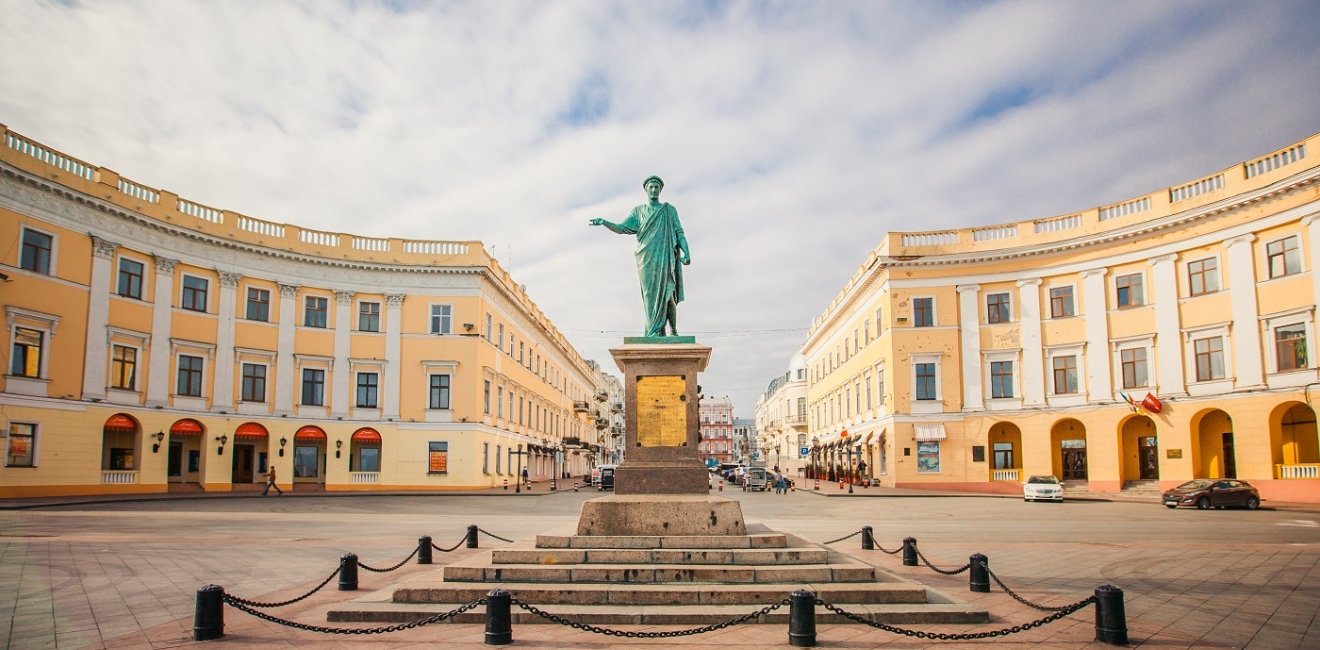
A blog of the Kennan Institute
BY BLAIR A. RUBLE
On September 6, the Odesa Philharmonic Orchestra performed under the direction of Principal Conductor Hobart Earle at the prestigious Berliner Musikfest. The Orchestra’s program featured several works by Ukrainian composers before ending with Jean Sebelius’s Second Symphony.
The concert began with the Ukrainian national anthem followed by a performance of Myroslav Skoryk’s evocative short piece “Dytyntsvo” (“Childhood”) from Sergei Parajanov’s masterful 1965 magical realist film “Shadows of Forgotten Ancestors.” Mykola Lysenko’s elegant “Elegy” followed, offering a touching remembrance to those lost in war.
Pianist Tamara Stefanovich performed Alemdar Karamanov’s haunting “Ava Maria” Piano Concerto No. 3. Karamanov’s insistence on composing music based on religious texts undercut his renown in the Soviet Union. In this instance, he turned to themes from Egyptian ritual to connect with the Biblical story of the flight from Egypt.
Jean Sibelius’s magnificent Second Symphony provided the evening with a grandiose finale. Sibelius’s work was taken at the time of its premier in 1902 as a call for Finnish independence from Tsarist Russia. Fittingly for then and now, it quickly became known as the “Symphony of Independence.”
Two encores followed, Skoryk’s “Melodiya” and the overture to Lysenko’s opera “Taras Bulba.”
The concert had a political overtone, with Ukrainian Ambassador to Germany Andrej Melnyk, German Minister of State for Culture Claudia Roth in attendance. The hall for 2,300 listeners was packed with a large number of at-times flag waiving Ukrainian audience members as well as many Berlin music buffs. Standing applause, cheers, and overflowing emotions marked the evening.
More important, the concert proved to be an artistic achievement. Reviewers commented on the orchestra’s high-quality execution of the Sibelius symphony as well as on Stefanovich’s performance of Karamanov. As Hans Ackermann observed on the Rundfunk Berlin-Brandenburg (Berlin-Brandenburg Broadcasting) evening show, “a dark warm sound builds up more than once. Starting with the double bases, which the conductor has placed in a row at the very back, the music then spreads with all of its might through the excellent winds and strings in the hall. Here is a body of sound at work whose power probably comes from great inner unity.”
The renowned music critic Wolfgang Schreiber, writing on September 7 in Süddeutsche Zeitung, asked “Can the Odesa Philharmonic Orchestra, founded in 1937, score artistically in the international music scene? The clear yes has two reasons. On the one hand, the ensemble from the cultural city of Odesa is musically capable of an all-round convincing, even brilliant performance. On the other hand, this has to do with its engaging and gifted chief conductor Hobart Earle.” The Odesa Philharmonic was one of only a handful among the world’s best orchestras to be invited to perform as part of this famous festival (among the other orchestras were the Philadelphia and Cleveland orchestras from the US). The evening was one of the first concerts presented by the Odesa Philharmonic since Russia invaded Ukraine in February. The ensemble’s last concert in Odesa had taken place the Saturday evening before, ending with a stirring encore featuring the Overture to Mykola Lysenko’s opera “Taras Bulba” (this concert is featured in the post in this series “Ode to Odesa” from March 2, 2022).
Orchestra members scattered following their final prewar concert. Some joined the Ukrainian armed forces at the front; others sought refuge in western Ukraine, Europe, Israel, and North America. Maestro Earle honored conducting commitments in Europe and the United States. In late Spring, at the invitation of Daniel Barenboim, Earle lectured with videos about Ukrainian music in wartime at Berlin’s Pierre Boulez Saal. He later repeated the same lecture in Miami.
The invitation to perform in the Berliner Musikfest drew ninety orchestra members back to Odesa to rehearse prior to a trial concert in Chisinau, Moldova; followed by the Berlin performance four days later. Moldovan Prime Minister Gavrilița, President of the Moldovan Parliament Grosu and US Ambassador Kent Logsdon attended the Chisinau concert. This performance marked Odesa’s “City Day” and featured much the same program as in Berlin with pianist Oleksandr Perepelytsia playing the Karamanov concerto.
The December 1991 collapse of the Soviet Union destroyed more than a superpower-driven empire. Everything from supply chains and transport links to education and health care imploded with it. Each aspect of life fell apart, including the once proud Soviet Big Red Machines of classical music, ballet, gymnastics, and hockey. Hundreds of world-class musicians, dancers, and sports figures scurried to safety wherever they could find it. Orchestras and dance companies, hockey teams and gymnastics gyms filled with former Soviet talent from Argentina’s Pampas to Canada’s Prairies, Japan’s Kansai and the rice bowls of South Asia.
A few intrepid pioneers set out in the opposite direction, Venezuelan American conductor Hobart Earle among them. Earle joined those swimming against the tide by heading to Odesa in a newly independent Ukraine, where he transformed the struggling Odesa Philharmonic Orchestra into an ensemble worthy of international recognition.
Earle was born in Caracas in 1960 in a family of ex-pat Americans. He attended the Gordonstoun School in Scotland before heading off to Princeton University. His musical studies took him to Vienna’s prestigious University of Music and Performing Arts, which opened the door to the “Wild East” of Ukraine. Along the way, he studied composition and music theory with Milton Babbitt, Edward Cone, Claudio Spies, and Paul Lansky. As a member of the Vienna Singverein, he performed and recorded under Herbert von Karajan and Lorin Maazel. His career easily could have remained focused on Europe or the United States. Instead, he took an extreme chance and bet on Odesa.
For all their fame, Odesa’s major musical institutions—its orchestra. conservatory, and opera—had fallen increasingly on hard times by the twentieth century’s last decades. The collapse of the Soviet Union accelerated a long decline to penury. This was the condition of the once famous Odesa music scene when young Hobart Earle arrived to assume the artistic leadership of the local philharmonic orchestra.
Earle set out to consolidate existing resources to retain musicians at a livable wage, to attract new musicians, to expand their repertoire, and to protect the orchestra’s famed concert hall that was under constant assault from rapacious real estate interests. All the while he fought to sustain and expand the orchestra’s audience base; no small task in a community in which the Soviet era middle class was rapidly sliding into poverty. He has succeeded in large measure because he made the orchestra’s revival part of a larger civic renewal for the city. He positioned the philharmonic as a potent symbol of post-Soviet Odesa. The orchestra’s rebirth thus became part of the city’s resurgence.
The city and the orchestra became ever more formidable as Ukrainian independence took hold. Earle’s own reputation grew as well, as recognized by the Ukrainian government when he was granted the title of People’s Artist of Ukraine.
For all of this accomplishment, much of the Classical music mainstream remained centered on Russian composers and musicians. Ironically, Putin’s invasion has cast a spotlight on a reality that Putin has sought to deny. As Berlin audiences recently witnessed, Ukraine has its own cultural traditions worthy of world attention.
The opinions expressed in this article are those solely of the author and do not reflect the views of the Kennan Institute.
Author

Former Wilson Center Vice President for Programs (2014-2017); Director of the Comparative Urban Studies Program/Urban Sustainability Laboratory (1992-2017); Director of the Kennan Institute for Advanced Russian Studies (1989-2012) and Director of the Program on Global Sustainability and Resilience (2012-2014)

Kennan Institute
The Kennan Institute is the premier US center for advanced research on Eurasia and the oldest and largest regional program at the Woodrow Wilson International Center for Scholars. The Kennan Institute is committed to improving American understanding of Russia, Ukraine, Central Asia, the South Caucasus, and the surrounding region through research and exchange. Read more

Explore More in Focus Ukraine
Browse Focus Ukraine
Ukrainian Society Under Occupation: Hardship and Civic Resilience

Creating Rules of the Game for Contemporary Ukrainian Theater

Ukraine Between 1991 and 2022: The Problem of the Blank Canvas

